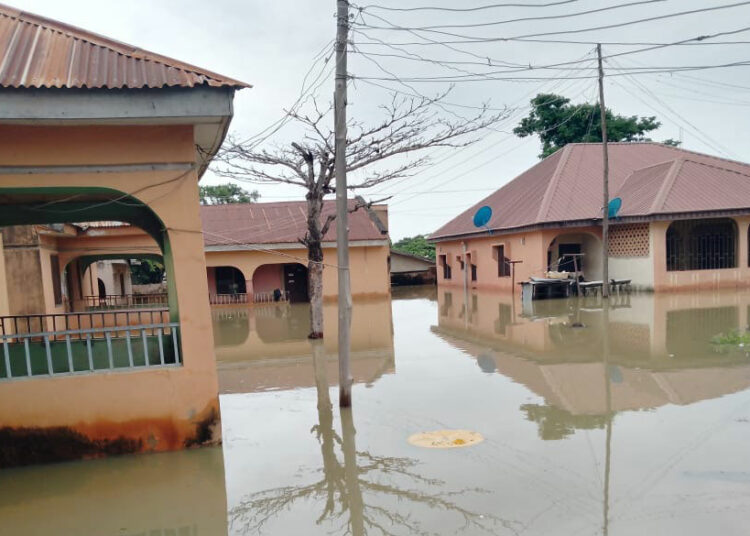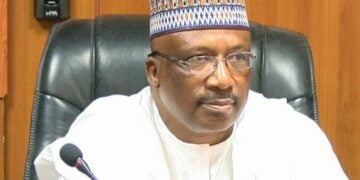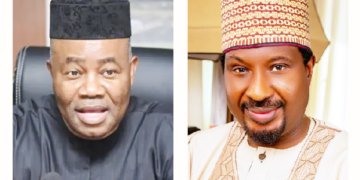As the ravaging floods finally recede across the country after weeks of havoc, the natural disaster has recorded about 40 percent increase in the figure of internally displaced persons (IDPs), bringing the number of IDPs to about 5 million from 3.4 million as contained in 2021 Displacement Tracking Matrix carried out by (UNHCR) Matrix Index as well as the International Organization of Migration (IOM).
Federal commissioner of National Commission for Refugees, Migrants and Internally Displaced Persons (IDPs), Imaan Ibrahim, who disclosed the increasing effect of climate change and particularly the debilitating effect of floods across the country, has led to significant loss of many lives, properties and livelihood.
She spoke at an event marking the National Day for Displaced Persons (IDPs) with the theme: “Journey so far, future of durable solutions,” at the presidential villa, Abuja.
Speaking on the Commission’s Exit Camp Strategy, she said the implementation plan of the IDP Policy, the national action on durable solutions and domestication of the Kampala Convention will support the drive towards the provision of durable solution.
She stated: “You know that kind of problem we address is something that is reoccurring, hence the need for that coordinated approach. But what I will like to assure you is the commitment of the federal government to ensure that we work hand in hand with the POCs so that we can address all the issues of concerns and so that we can ensure their total rehabilitation, integration and resettlement. It is work in progress, but we have a grip of the situation.”
On his part, President Muhammadu Buhari assured that this administration remains fully committed to the welfare and well-being of all Nigerians at all times, even as number of displaced persons in the country has risen to about five million.
The president reaffirmed Nigeria’s commitment to helping all internally displaced persons by offering long-lasting solutions that guarantee their rehabilitation, reintegration and resettlement into society.
Represented by his chief of staff, Ibrahim Gambari, the president, commended the resilience of the IDPs, recalling that it was the increasing incidence of forced displacement resulting from ethnic, religious, economic and boundary conflicts, natural and man-made disasters, and its attendant massive destruction to lives and property that compelled the federal government to embark on a search for durable solutions through the drafting and signing of a National Policy on Internally Displaced Persons by FEC in 2021.
He said the event was to raise awareness on the plight of IDPs in Nigeria by recognising their courage and resilience while ensuring their participation in society and relevant decisions that affect them and promote their empowerment.
Buhari noted that this year’s celebration offered the opportunity as a nation to publicly and symbolically demonstrate solidarity with those who lost their livelihoods, homes and even their loved ones to displacement.
Also, the minister of Humanitarian Affairs, Disaster Management and Social Development, Sadiya Umar Farouk, on her part regretted the devastating effects of the flood, saying: “It is a sad global phenomenon as a result of Climate change, which has also doubled the number of displaced persons Nationwide and globally.
She said, “I want to reassure all Nigerians that the Federal Government is prepared to do everything possible to mitigate the impact of this natural disaster while providing succor to ensure that our citizens are able to rebuild their lives.”
Flood Killed 24, Displaced 471,000 Persons – Kogi Govt
The highlight of the event was the conferment of awards to outstanding Nigerians among them is the ED/CEO, Dr Faisal Shuaib, an “Award of Recognition for providing Health Care to Persons of Concern during the COVID-19 pandemic through vaccination against the virus.”
According to the commission, the award is in recognition of his contributions towards ensuring that IDPs have equal access to COVID-19 vaccines and other health interventions in the various IDP camps in Nigeria.
Bayelsa Govt Faults Minister
Meanwhile, the Bayelsa State government yesterday slammed the minister of Humanitarian Affairs, Disaster Management and Social Development, Sadiya Farouq, over her comments that Bayelsa State is not one of the ten most impacted states by the 2022 flood.
According to the state government, though the government and people of the state believe that the Federal Ministry and its agencies have abandoned their responsibility and are not interested in managing the disaster, the comment is disheartening.
The Bayelsa government, in a statement issued by the state commissioner for Information, Orientation and Strategy, Ayiba Duba, described the comment of the minister that the state is not one of the ten most impacted states by the 2022 flood as spurious.
The statement noted: “The Minister’s claim is disheartening but not surprising. The slow response to the humanitarian crisis arising from the flood despite the President’s directive for her to come to the aid of the state is indeed a confirmation of our belief that the Federal Ministry and its agencies have abandoned their responsibility and are not interested in managing the disaster”
“Indeed, the Minister is already turning into part of the disaster she was appointed to manage. She had earlier claimed that only four Local Government Areas of the state were impacted by the unprecedented flood. She was obviously relying on bogus data in contradiction to the clear reality that every local government in the state is impacted by the flood in varying degrees.”
“The way the minister has treated our state is so unfortunate that our people are beginning to doubt that we are part of Nigeria. She sat comfortably in Abuja to determine the most flooded!!!
“Is it not curious that since the devastation occasioned by the flood occurred a month ago, no representative of the FG has visited our state to assess the situation? The Federal Government has not shown the minutest of empathy since this monumental devastation hit our state.”
“And we are asking, is Bayelsa State still part of Nigeria? Are we only important when it is time to exploit the resources in our land? If the humanitarian minister is sincere, let her tell Nigerians the relief materials brought to the state and who received them’.
“The Minister and Indeed the Federal Government are not fair to our people who have undergone trauma of losing loved ones, homes and livelihood. In fact, the minister’s bogus data with which she came to the conclusion that Bayelsa was not even one of the ten most impacted contradict basic science, common sense, concern and kindness.
“How can a state up North, Jigawa, be worst impacted when indeed Bayelsa State has the unfortunate responsibility of receiving the flood water that ran through more than 15 states?
“The data used by the Federal ministry to arrive at the conclusion is suspect and erroneous. How was it arrived at? By sitting in an office and conjuring figures? By the reality on ground, over 300 communities were impacted by the flood and almost a million people were displaced from their homes, many of them losing their livelihood, in Bayelsa State. And no other state in the Federation is so impacted.”
“If the Minister is desirous of doing a good job, she should leave her cozy office in Abuja and come to Bayelsa State to ascertain the truth, even as the flood began to recede”
Meanwhile, the monarch of Gbanraun Kingdom in Southern Ijaw local government area of Bayelsa State, King Frank Fieke-Okiakpe, The Pere-Agadagba of Gbanraun Kingdom, was weekend rescued and relocated to a dry land to avoid being submerged along with his kingdom by the flood.
The monarch who spoke with LEADERSHIP Weekend a few days after he was taken out of the community described the situation as unimaginable and terrifying.
He appealed to the federal government and interventionist agencies to intervene and save the Kingdom from imminent extinction occasioned by perennial flooding that has led to untold hardship, environmental hazards and health challenges.
He said sources of the people’s livelihood are also cut- off leaving the traditional farmers and fishermen to live below the poverty line.





